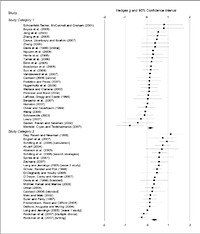Of course, we're all attracted to the arena's in which we claim or think we have some sort of expertise. I for my part feel I have expertise in reading and understanding meta-analyses. This come in no small part because of my early exposure to the meta-analysis in the field of parapsychology.
And it's a meta-analysis has completely absorbed my attention when really I should be trying to write my final tutor-marked assignment TMA04. I 'found' the study through the various RSS feeds that I'm subscribed to for education and technology. I'm sure I'd not have found it otherwise - so this is a measure of the success of web 2.0 in a small way.
This is a US study which assessed the studies that have directly contrasted online learning compared to traditional face to face learning. If there's one major critique I've got about the emphasis in H800 is that there's no real mention of the efficacy of online learning compared to any other style of learning (f2f, or correspondence, or independent computer courses, or video instruction etc). My impression is that it's all assumed or given by the respective authors of H800 that the technology enhanced education is 'better' and we're only now trying to discover 'why' it's better.
- So this report, finally answers some of my questions. And some of the answers are a surprise to me. Here are some highlights:
- Online was better on average than face to face instruction.
- The best learning effect is for blended learning.
- Very little research has been done on K-12 learning.
- Video or online quizzes appear to have no effect on what students learn online.
- Providing guidance for group work doesn't seem to enhance learning as much as it does for individual learning.
- The authors suggest caution when interpreting these results, in particular it might not be the medium. They note for instance that the online and blended modes, tend to force the student to spend more time on learning activities, including self reflection (hey I'm writing a blog too!!).
